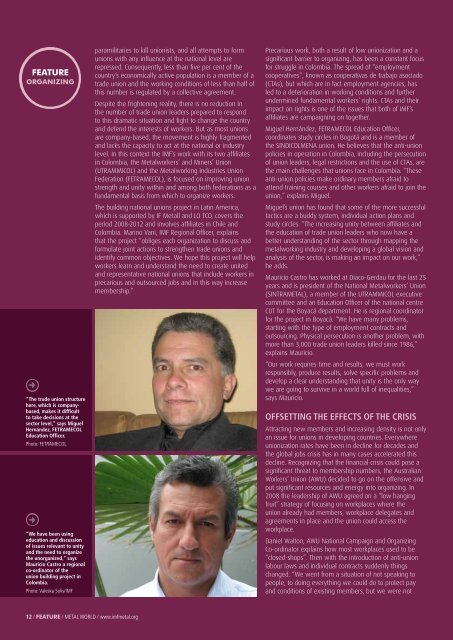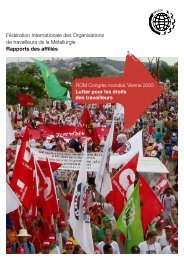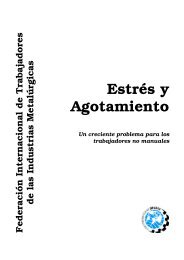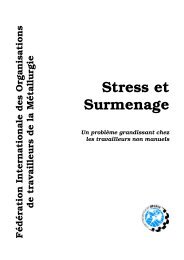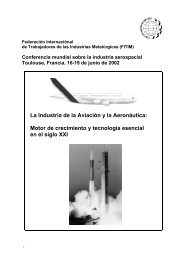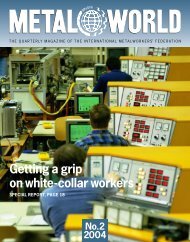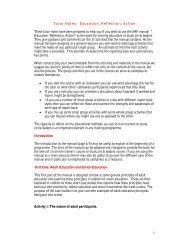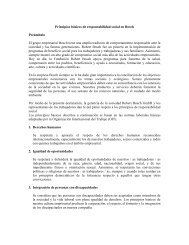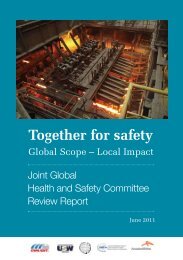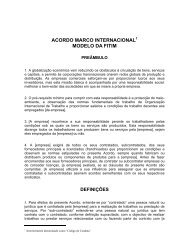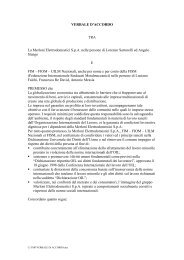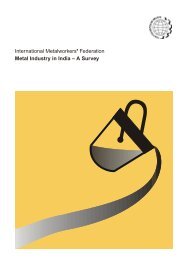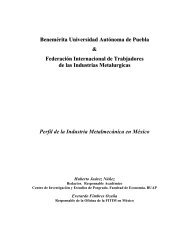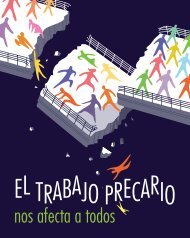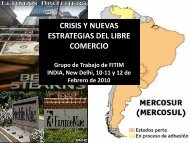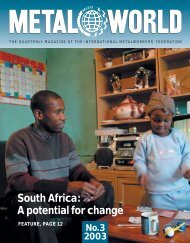Metal World 1 2011 - International Metalworkers' Federation
Metal World 1 2011 - International Metalworkers' Federation
Metal World 1 2011 - International Metalworkers' Federation
Create successful ePaper yourself
Turn your PDF publications into a flip-book with our unique Google optimized e-Paper software.
FEATURE<br />
ORGANIZING<br />
“The trade union structure<br />
here, which is companybased,<br />
makes it difficult<br />
to take decisions at the<br />
sector level,” says Miguel<br />
Hernández, FETRAMECOL<br />
Education Officer.<br />
Photo: FetraMeCol<br />
“We have been using<br />
education and discussion<br />
of issues relevant to unity<br />
and the need to organize<br />
the unorganized,” says<br />
Mauricio Castro a regional<br />
co-ordinator of the<br />
union building project in<br />
Colombia.<br />
Photo: Valeska Solis/IMF<br />
12 / FeatUre / <strong>Metal</strong> <strong>World</strong> / www.imfmetal.org<br />
paramilitaries to kill unionists, and all attempts to form<br />
unions with any influence at the national level are<br />
repressed. Consequently, less than five per cent of the<br />
country’s economically active population is a member of a<br />
trade union and the working conditions of less than half of<br />
this number is regulated by a collective agreement.<br />
Despite the frightening reality, there is no reduction in<br />
the number of trade union leaders prepared to respond<br />
to this dramatic situation and fight to change the country<br />
and defend the interests of workers. But as most unions<br />
are company-based, the movement is highly fragmented<br />
and lacks the capacity to act at the national or industry<br />
level. In this context the IMF’s work with its two affiliates<br />
in Colombia, the <strong>Metal</strong>workers’ and Miners’ Union<br />
(UTRAMMICOL) and the <strong>Metal</strong>working Industries Union<br />
<strong>Federation</strong> (FETRAMECOL), is focused on improving union<br />
strength and unity within and among both federations as a<br />
fundamental basis from which to organize workers.<br />
The building national unions project in Latin America,<br />
which is supported by IF <strong>Metal</strong>l and LO TCO, covers the<br />
period 2008-2012 and involves affiliates in Chile and<br />
Colombia. Marino Vani, IMF Regional Officer, explains<br />
that the project “obliges each organization to discuss and<br />
formulate joint actions to strengthen trade unions and<br />
identify common objectives. We hope this project will help<br />
workers learn and understand the need to create united<br />
and representative national unions that include workers in<br />
precarious and outsourced jobs and in this way increase<br />
membership.”<br />
Precarious work, both a result of low unionization and a<br />
significant barrier to organizing, has been a constant focus<br />
for struggle in Colombia. The spread of “employment<br />
cooperatives”, known as cooperativas de trabajo asociado<br />
(CTAs), but which are in fact employment agencies, has<br />
led to a deterioration in working conditions and further<br />
undermined fundamental workers’ rights. CTAs and their<br />
impact on rights is one of the issues that both of IMF’s<br />
affiliates are campaigning on together.<br />
Miguel Hernández, FETRAMECOL Education Officer,<br />
coordinates study circles in Bogotá and is a member of<br />
the SINDICOLMENA union. He believes that the anti-union<br />
policies in operation in Colombia, including the persecution<br />
of union leaders, legal restrictions and the use of CTAs, are<br />
the main challenges that unions face in Colombia. “These<br />
anti-union policies make ordinary members afraid to<br />
attend training courses and other workers afraid to join the<br />
union,” explains Miguel.<br />
Miguel’s union has found that some of the more successful<br />
tactics are a buddy system, individual action plans and<br />
study circles. “The increasing unity between affiliates and<br />
the education of trade union leaders who now have a<br />
better understanding of the sector through mapping the<br />
metalworking industry and developing a global vision and<br />
analysis of the sector, is making an impact on our work,”<br />
he adds.<br />
Mauricio Castro has worked at Diaco-Gerdau for the last 25<br />
years and is president of the National <strong>Metal</strong>workers’ Union<br />
(SINTRAMETAL), a member of the UTRAMMICOL executive<br />
committee and an Education Officer of the national centre<br />
CUT for the Boyacá department. He is regional coordinator<br />
for the project in Boyacá. “We have many problems,<br />
starting with the type of employment contracts and<br />
outsourcing. Physical persecution is another problem, with<br />
more than 3,000 trade union leaders killed since 1986,”<br />
explains Mauricio.<br />
“Our work requires time and results, we must work<br />
responsibly, produce results, solve specific problems and<br />
develop a clear understanding that unity is the only way<br />
we are going to survive in a world full of inequalities,”<br />
says Mauricio.<br />
OFFSETTING THE EFFECTS OF THE CRISIS<br />
Attracting new members and increasing density is not only<br />
an issue for unions in developing countries. Everywhere<br />
unionization rates have been in decline for decades and<br />
the global jobs crisis has in many cases accelerated this<br />
decline. Recognizing that the financial crisis could pose a<br />
significant threat to membership numbers, the Australian<br />
Workers’ Union (AWU) decided to go on the offensive and<br />
put significant resources and energy into organizing. In<br />
2008 the leadership of AWU agreed on a “low hanging<br />
fruit” strategy of focusing on workplaces where the<br />
union already had members, workplace delegates and<br />
agreements in place and the union could access the<br />
workplace.<br />
Daniel Walton, AWU National Campaign and Organizing<br />
Co-ordinator explains how most workplaces used to be<br />
“closed-shops”. Then with the introduction of anti-union<br />
labour laws and individual contracts suddenly things<br />
changed. “We went from a situation of not speaking to<br />
people, to doing everything we could do to protect pay<br />
and conditions of existing members, but we were not


